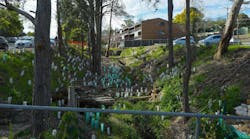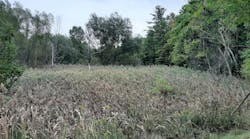Myths, Mantras, and Other Definers of Our Faith
More and more things I once knew as blazing facts fall by the wayside, leaving me with the queasy notion that soon enough, I will reach a point of terminal ignorance. For the most part, this problem lies at the feet of “The Paradox,” a two-headed beast with bad breath and even worse timing who has this awful habit of showing up at the brink of success and saying, “Damned if you do and damned if you don’t.”
Take, for example, the actions of a growing community’s public officials who approve plans for urban development in what has been an agricultural or rural area. The purpose is to provide more residential, commercial, and industrial capacity to meet increasing demands, and few would argue the legitimacy of their desires. It’s the unintended or unforeseen consequences that generally provide the excitement after the original hoopla dies down; increased population yields more traffic leading to more roads and more services with bigger parking lots.ad infinitum.
I recently reviewed a research report on the loss of agricultural land to urbanization. It was pointed out that three-quarters of the decline in ag land are the result of other factors. While I agree that urbanization per se might not be a major driver in the loss of arable land, I don’t think this means we should curtail discussion on the subject of development and its impact on soil loss, water and air quality, and the potential impact of these on agriculture. In fact, I would hope that future studies might wish to consider (1) conversion of prime ag land (where it should be patently obvious that all land is not created equal) and (2) accelerated soil loss almost everywhere as a result of increased development. I’d be interested in the results of any analyses you’ve seen in these areas as I would very much like to present an article on these combined impacts-urbanization, conversion of especially productive land, and accelerated soil loss in response to population growth, increased development, and suburban encroachment into traditional agricultural lands and the accompanying expansion of agriculture into less productive and relatively undisturbed areas.
All too often left out of discussion in meeting the legitimate need for urban (and suburban) expansion is the exploration of alternatives that envision the evolutionary nature of development-that it just doesn’t cease with the completion of the current project. Though I have seen a few projects that I thought were environmental disasters from day one, I think we face a far greater and more certain danger from the aggregation of numerous smaller projects whose linked effects go unnoticed until a triggering event brings about calamity. Imagine that.
I’m still wobbly in my thoughts about the establishment of regulatory sticks and carrots. Philosophically I resent them, but from a practical standpoint, I have come to question my stance-particularly when we get into the issue of deeply entrenched self-interests. I perceive that preservation of a free-market economy requires a strong-enough dose of self-restraint-a precious commodity in this day and age.
My concern with the ag-land-loss study is whether its conclusions are germane. I wonder whether they might serve to mask more fundamental issues, such as accelerated soil loss from increased development and accelerated changes to the ecosystems that have brought us to where we are. I don’t know whether or not global warming is good, bad, or even for real. I have no way to measure the Earth’s ability to absorb the industrial-age assault or whether the long-range results will be positive or negative for life as we know it. With some certainty I believe that the world my grandchildren inherit and their ability to adapt to it will be different. What really scares me is that as the impacts of these changes become more pronounced, we’ll see the rise of tyrants peddling draconian solutions. And why not, if we’re not willing to show self-restraint and ask the same of our elected officials?


